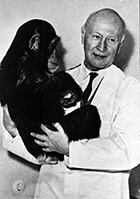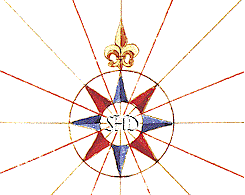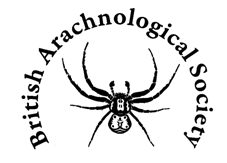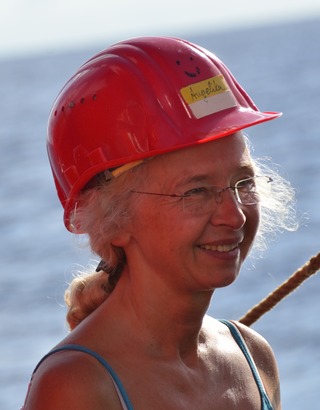
Emil Hans Willi Hennig was a German biologist and zoologist who is considered the founder of phylogenetic systematics, otherwise known as cladistics. In 1945 as a prisoner of war, Hennig began work on his theory of cladistics, which he published in German in 1950, with a substantially revised English translation published in 1966. With his works on evolution and systematics he revolutionised the view of the natural order of beings. As a taxonomist, he specialised in dipterans.
The Linnean Society of London is a learned society dedicated to the study and dissemination of information concerning natural history, evolution, and taxonomy. It possesses several important biological specimen, manuscript and literature collections, and publishes academic journals and books on plant and animal biology. The society also awards a number of prestigious medals and prizes.
The Zoological Society of London (ZSL) is a charity devoted to the worldwide conservation of animals and their habitats. It was founded in 1826. Since 1828, it has maintained the London Zoo, and since 1931 Whipsnade Park.

Bernhard Rensch was a German evolutionary biologist and ornithologist who did field work in Indonesia and India. Starting his scientific career with pro-Lamarckian views, he shifted to selectionism and became one of the architects of the modern synthesis in evolutionary biology, which he popularised in Germany. Besides his work on how environmental factors influenced the evolution of geographically isolated populations and on evolution above the species level, which contributed to the modern synthesis, he also worked extensively in the area of animal behavior (ethology) and on philosophical aspects of biological science. His education and scientific work were interrupted by service in the German military during both World War I and World War II.

The Ecological Society of America (ESA) is a professional organization of ecological scientists. Based in the United States and founded in 1915, ESA publications include peer-reviewed journals, newsletters, fact sheets, and teaching resources. It holds an annual meeting at different locations in the USA and Canada. In addition to its publications and annual meeting, ESA is engaged in public policy, science, education and diversity issues.
The Botanical Society of America (BSA) represents professional and amateur botanists, researchers, educators and students in over 80 countries of the world. It functions as a United States nonprofit 501(c)(3) membership society.

Philipp Bertkau was a German zoologist born in Cologne.

The Marine Biological Association of the United Kingdom (MBA) is a learned society with a scientific laboratory that undertakes research in marine biology. The organisation was founded in 1884 and has been based in Plymouth since the Citadel Hill Laboratory was opened on 30 June 1888.

Society for the History of Discoveries, founded in 1960, is an international, United States-based, organization formed to stimulate interest in teaching, research, and publishing the history of geographical exploration. Its members include those from several academic disciplines as well as archivists, non-affiliated scholars, and laypersons with an interest in history. SHD advances its goals by organizing annual meetings at which pertinent scholarly research papers are presented, by publishing a scholarly journal with articles on geographic exploration, and by annually offering an award to student research papers in the field. The Society is a US non-profit 501(c)(3) organization administered by a voluntary and unpaid team of council members and officers. Membership is open to all who have an interest in the history of geographical exploration. It publishes a semiannual journal, Terrae Incognitae.

The British Arachnological Society (BAS) is the UK’s first body devoted exclusively to the study of arachnids. The primary objectives of the Society are to encourage interest in arachnology in people of all ages and to generate, promote and disseminate arachnological knowledge and understanding by all suitable means. In particular, it works to foster co-operation between amateur and professional arachnologists.

The Pakistan Mathematical Society, is a learned society for mathematical sciences, possibly the largest learned society of its own kind, and a research institute to promote mathematics in the country. The Pakistan Mathematical Society is an association of professional mathematicians dedicated to promote mathematical science and research and interest in the country. The organization annually published various publications, and held conferences as well as annual monetary awards and prizes to mathematicians.
The Willi Hennig Society "was founded in 1980 with the expressed purpose of promoting the field of phylogenetic systematics." The society is represented by phylogenetic systematists managing and publishing in the peer-reviewed journal titled Cladistics. The society is named after Willi Hennig, a German systematic entomologist who developed the modern methods and philosophical approach to systematics in the 1940s and 1950s. The society is also involved in reconstructing the tree of life. The current president, Ward Wheeler of the American Museum of Natural History, was elected in 2016, succeeding Dr. Jyrki Muona.

Archiv für Molluskenkunde is a peer-reviewed scientific journal published by the Senckenberg Nature Research Society, covering research in malacology.
Peter Ax was a German zoologist. His main work concerned the investigation of interstitial fauna and the exposition of a phylogenetic system for the animals.

Kåre Bremer is a Swedish botanist and academic. He has also been Vice-Chancellor of Stockholm University.

Angelika Brandt is the world leader in Antarctic deep-sea biodiversity and has developed, organised and led several oceanographic expeditions to Antarctica, notably the series of ANDEEP cruises, which have contributed significantly to Antarctica and deep-sea biology. Brandt was the senior scientist of ANDEEP which was devoted entirely to benthic research in the Antarctic abyss.

The Orthodontic Technicians Association (UK) (OTA) is the professional body that represents orthodontic technologists, based in the United Kingdom.

Edith Kann was an Austrian teacher and botanist, specializing in phycology. She was a leading expert on blue-green algae.
Albrecht Manegold is a German ornithologist and paleontologist. He is the curator of the vertebrate collection at the State Museum of Natural History Karlsruhe. He is known for contributions to the study of early passerine evolution. He has described extinct passerines and piciformes including the fossil treecreeper Certhia rummeli and the fossil woodpecker Australopicus nelsonmandelai.
The Regensburg Botanical Society, founded 1790 in the city of Regensburg, Bavaria, Germany, is the oldest extant scientific society focused on botany. It was initially supported by the Prince-Archbishop Karl Theodor von Dalberg of Regensburg. Over the centuries the society has held scientific meetings, published scientific journals and had a botanic garden, herbarium and library. In the twentieth century the society extended its role into nature conservation. It currently collaborates closely with the University of Regensburg.












